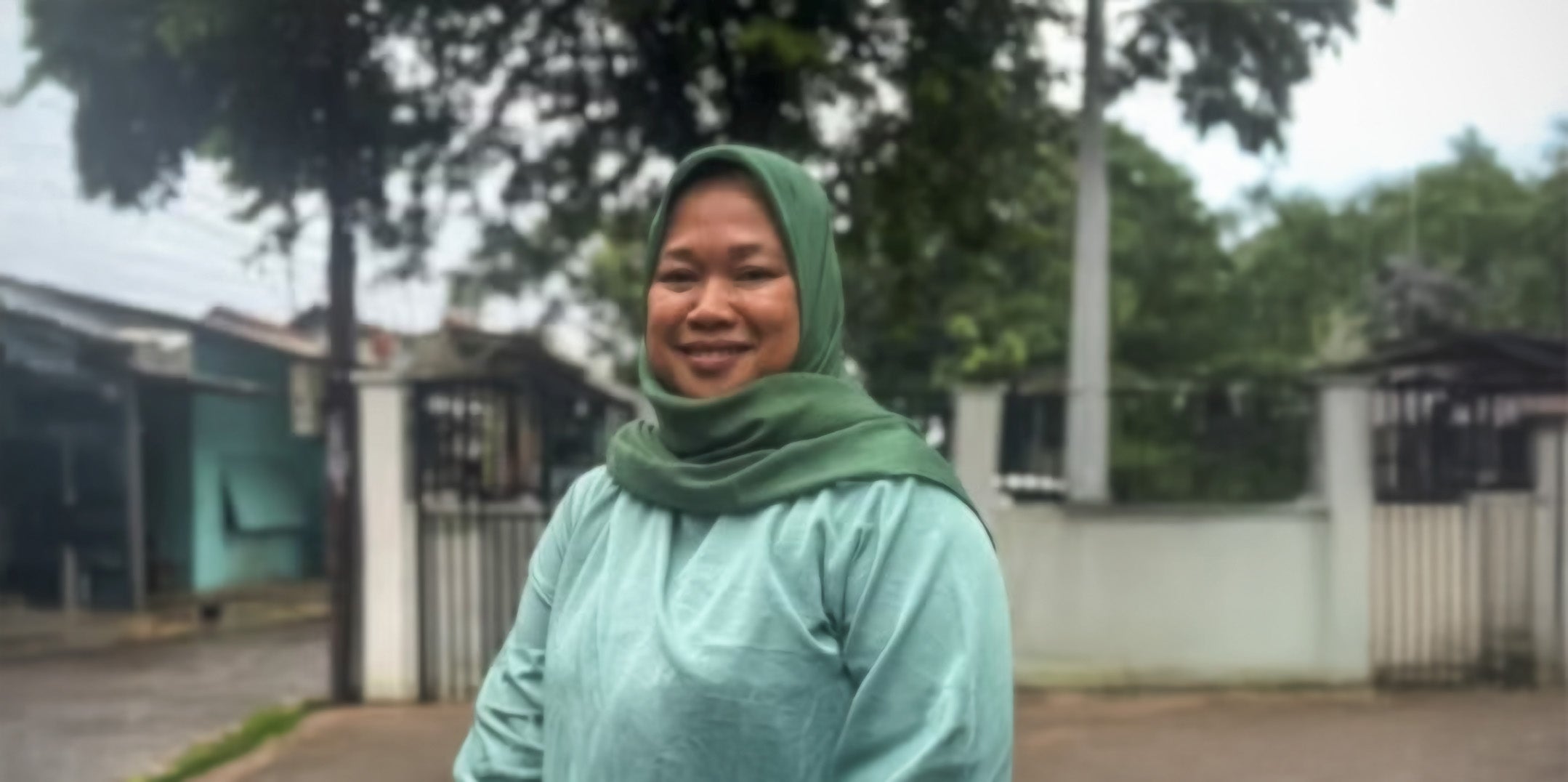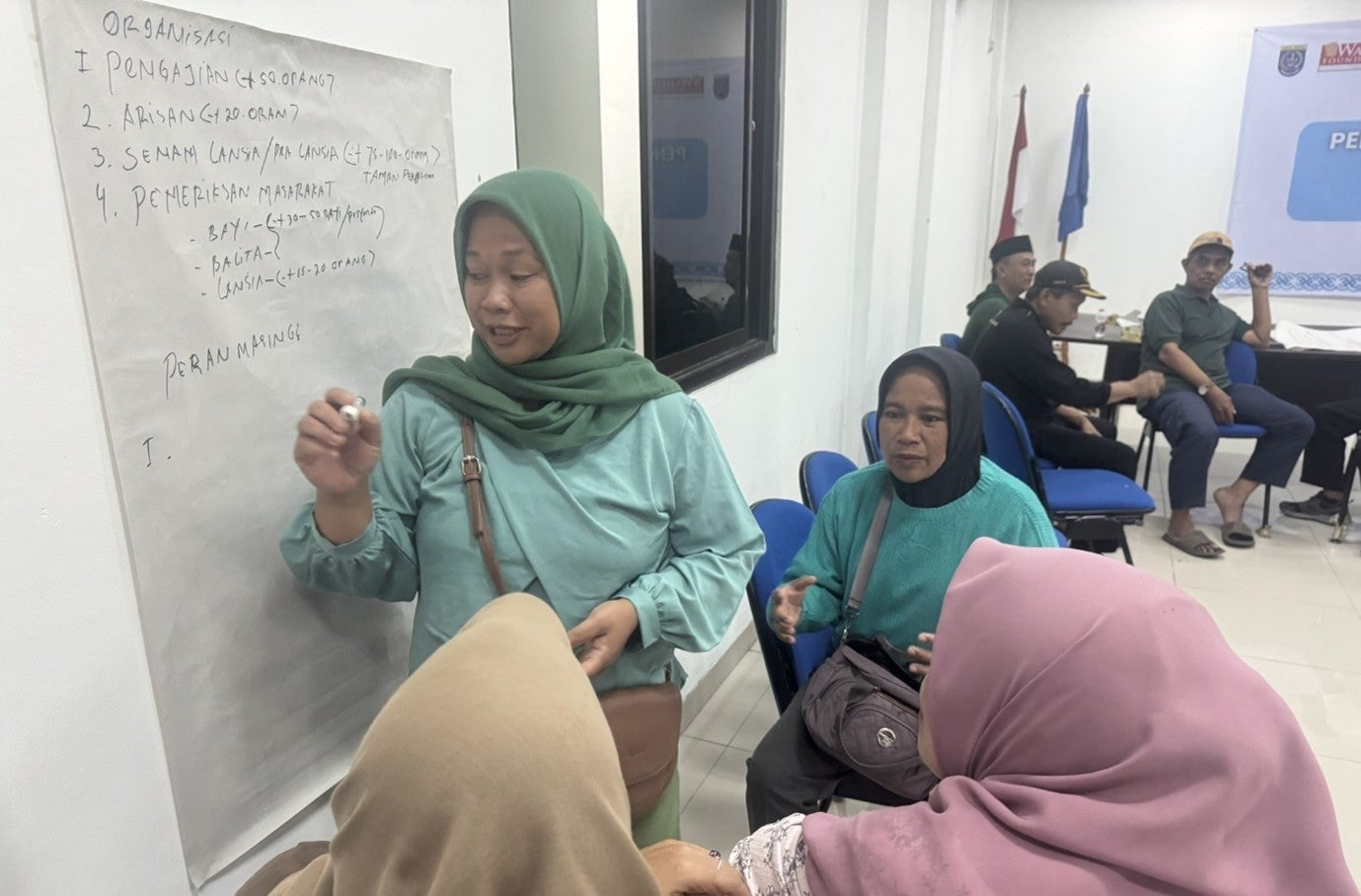Curahan Hati Nuryati: Kami membela penyintas kekerasan dalam rumah tangga
Tanggal: Selasa, 10 Desember 2024
Interview oleh: Inggita Notosusanto

Nuryati, 45 tahun, adalah seorang ibu dari tiga anak dan merupakan penduduk asli Pengasinan, Depok, Jawa Barat, Indonesia. Ia berpartisipasi dalam program Desa Damai, sebuah inisiatif dari Wahid Foundation yang didukung oleh UN Women, dan saat ini didukung oleh Pemerintah Belanda. Sejak 2017, Nuryati aktif terlibat dalam program pengembangan kapasitas bagi aktivis perdamaian yang digagas Wahid Foundation. Melalui program ini, ia termotivasi untuk memimpin salah satu kelompok kerja (pokja), membantu komunitasnya menangani kasus kekerasan dalam rumah tangga dengan melaporkannya kepada pihak berwenang melalui TRC (Tim Respon Cepat).
Di komunitas kami, orang-orang dulunya sering tidak percaya pada mereka yang berbeda, terutama terkait cara mereka menjalankan keyakinannya. Hal ini sering memicu perilaku reaktif yang berujung pada konflik. Namun, setelah program Desa Damai diperkenalkan, kami mulai mengenali dan memahami jenis-jenis pesan provokatif yang dapat memicu konflik. Kami belajar untuk berhenti sejenak dan berpikir sebelum bereaksi dengan kekerasan.
Saya sangat bersyukur bisa menjadi bagian dari program ini. Saya dipercaya untuk memimpin sebuah pokja, dan dalam Tim Respon Cepat (TRC)-nya, saya bekerja sama dengan relawan lainnya untuk memastikan bahwa laporan kekerasan dalam rumah tangga di komunitas kami mendapatkan perhatian dan bantuan dari pihak berwenang. Kami juga mendukung dan mendampingi para penyintas. Ketika mereka membutuhkan bantuan, kami menemani mereka karena prosesnya cukup membuat mereka cemas jika harus dilalui sendirian.

Sejak bergabung dalam program Desa Damai, rasa percaya diri saya tumbuh pesat. Program ini mengajarkan kami keterampilan hidup yang berguna, seperti berbicara di depan umum, dan sekarang saya merasa nyaman berbicara di depan orang banyak. Saya bahkan menjadi pemimpin dalam prakarsa di komunitas. Bahkan di rumah, saya telah berubah dari seorang ibu rumah tangga yang pemalu menjadi seseorang yang berani menyuarakan pendapatnya dan berkontribusi dalam pengambilan keputusan di keluarga. Saya juga melihat bahwa anggota lain dari Kelompok Kerja Desa Damai mengalami perubahan serupa setelah berpartisipasi dalam program ini.
Program Desa Damai sudah berkontribusi dalam mempromosikan perdamaian dan harmoni di komunitas kami, tetapi ini adalah proses yang perlu terus kami lakukan. Sebagai contoh, konflik kekerasan muncul di sekitar sekolah. Saya mendengar dari anak bungsu saya bahwa masalah- masalah di kalangan pemuda — seperti penggunaan alkohol dan narkoba — semakin meningkat dan akan memicu lebih banyak perkelahian antar siswa jika tidak ditangani. Saya merasa terpanggil untuk mengambil tindakan sebagai cara untuk membangun perdamaian di komunitas kami, mungkin dengan berbicara kepada siswa di sekolah menengah pertama di wilayah Pengasinan. Keinginan saya adalah agar program Desa Damai dijadikan program pemerintah karena saya melihat ini sangat baik dan memberikan manfaat jangka panjang bagi komunitas kami.
Desa Damai (Peace Village) adalah program yang diinisiasi oleh UN Women bekerja sama dengan Wahid Foundation di Jawa Barat sejak 2017 dan diperpanjang hingga 2024 dengan dukungan dari Pemerintah Belanda. Dilaksanakan di desa-desa di Depok dan Bogor, Jawa Barat, program ini berfokus pada pemberdayaan perempuan dan pembangunan perdamaian untuk mengatasi konflik yang terjadi di masyarakat.
Kerja-kerja Nuryati berkontribusi pada Tujuan Pembangunan Berkelanjutan (TPB) 5 tentang kesetaraan gender dan pemberdayaan perempuan dan anak perempuan, serta TPB 16 yang mempromosikan masyarakat yang damai dan inklusif.